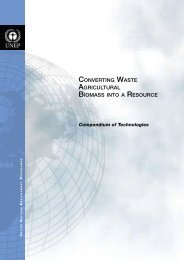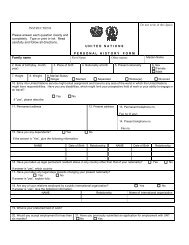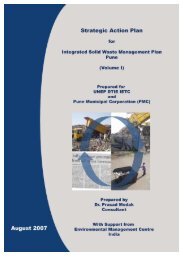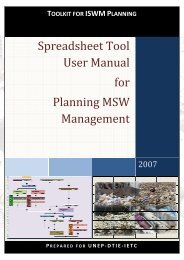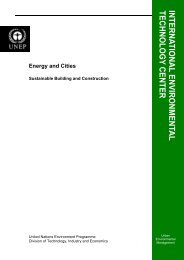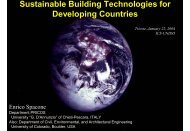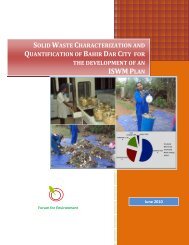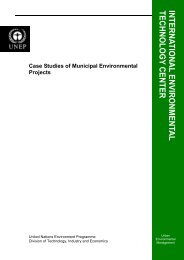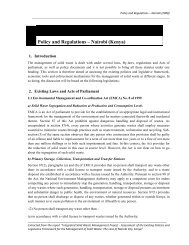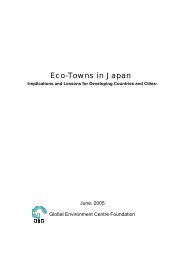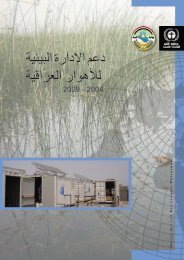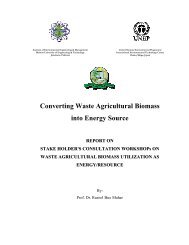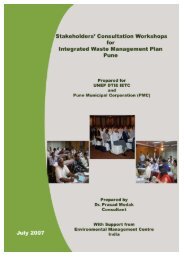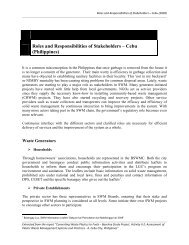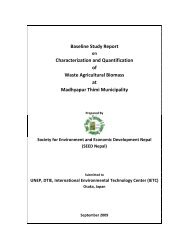WEEE/E-waste Business Model - International Environmental ...
WEEE/E-waste Business Model - International Environmental ...
WEEE/E-waste Business Model - International Environmental ...
Create successful ePaper yourself
Turn your PDF publications into a flip-book with our unique Google optimized e-Paper software.
1.2 Project Objectives<br />
The objective of the proposed project is to formulate, design and implement an<br />
integrated <strong>WEEE</strong>/E-<strong>waste</strong> management pilot project in PPM. After augmentation of local<br />
capacity, the level of effort could be scaled up to the national level and replicated in<br />
other countries. Specific objectives of the proposed pilot project are given below.<br />
• Build the national and local capacity in Cambodia on inventorization and<br />
management of E-<strong>waste</strong> by undertaking various activities, including the inventory of<br />
E-<strong>waste</strong> and a pilot project to process E-<strong>waste</strong> in and environmentally sound manner<br />
with optimum level of recovery for recycling.<br />
• Bring out the guidelines and training materials for dissemination for other developing<br />
countries to replicate similar projects and capacity building process.<br />
1.3 Approach and Methodology<br />
The capacity building is designed for government institutions, private sector and local<br />
NGO. The current capacity building effort is being targeted in two major areas i.e. E<strong>waste</strong><br />
inventorization and E-<strong>waste</strong> management. UNEP has already produced two<br />
volumes of E-<strong>waste</strong> Manual. The first volume provides guidelines for E-<strong>waste</strong><br />
inventorization, while second volume provides guidelines for E-<strong>waste</strong> Management. This<br />
project will utilize these manuals as part of their comprehensive approach and<br />
methodology as described below:<br />
Activity 1: Inventory of E-<strong>waste</strong><br />
• Assessment of the Phnom Penh City with respect to generation of E-<strong>waste</strong> from<br />
various sources (residential, commercial, industrial, inter-city, etc.)<br />
• Establishment of Material flow with respect to E-<strong>waste</strong> generation in Phnom Penh<br />
City and identification of stakeholders<br />
• Quantification and characterization of E-<strong>waste</strong> in Phnom Penh City, including<br />
quantity of various types as well as characterization of each type of E-<strong>waste</strong><br />
• Technical assistance to institutionalize E-<strong>waste</strong> inventory and its updating with<br />
Phnom Penh City Government<br />
Output: Report on current inventory and future projections of <strong>WEEE</strong>/ E-<strong>waste</strong> and<br />
mechanism for its update.<br />
Activity 2: Study of E-<strong>waste</strong> recycling structure<br />
• Study of E-<strong>waste</strong> recycling/ other recycling infrastructure (formal/informal) and its<br />
capacity<br />
• Study of E-<strong>waste</strong> toxic footprint by inventorizing E-<strong>waste</strong> recycling sites in case<br />
recycling occurs in informal sector in Phnom Penh City<br />
• Study of the feasibility of the level of treatment of E-<strong>waste</strong> in formal sector in Phnom<br />
Penh City<br />
Output: Status report on existing recycling system and its capacity.<br />
7



